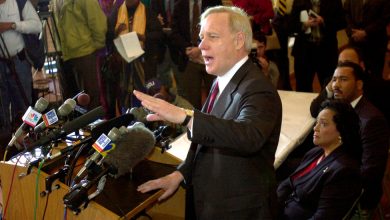Your Thursday Briefing


Emergency employees and volunteers carrying an injured pregnant woman from a maternity hospital damaged by Russian shelling on Wednesday in Mariupol, Ukraine.Credit…Evgeniy Maloletka/Associated Press
The heavy toll of war on Ukraine
The death, destruction and deprivation of war are mounting in Ukraine, from which an estimated two million people have fled seeking refuge. In the southern city of Mariupol, Russian commanders appear to be resorting to tactics used in Chechnya and Syria: flattening settlements with overwhelming and indiscriminate firepower.
An apparent Russian strike on a maternity hospital in Mariupol destroyed buildings and wounded patients and staff members. Across the city, hundreds of casualties have been reported. All escape routes have been blocked for days, and people are cutting down trees to build fires for heat and cooking. See maps of the invasion.
Efforts to negotiate a cease-fire to give civilians a chance to escape have failed repeatedly. For the past three days, the prospect that relief could reach the city though a “humanitarian corridor” fell apart in a hail of mortar and artillery fire.
Victims: “My whole family died in what you call a special operation and we call a war. You can do what you want with me. I have nothing left to lose.” The story of a family ripped apart by the violence.
In other news from the war:
-
The loss of Russian oil will cause upheaval on the markets of a kind not seen in decades.
-
In recent days, the Kremlin has signaled that Russia is no longer bent on regime change in Kyiv.
-
Lawmakers completed a $13.6 billion aid package for Ukraine, doubling the White House’s initial request.
Russia accuses the U.S. of ‘economic war’
A day after President Biden prohibited energy imports from Russia to the U.S., Dmitri Peskov, the Kremlin spokesman, accused Washington of declaring “an economic war” via its sanctions, which are enacting a viselike grip on the Russian economy and have sent the ruble tumbling to its lowest levels in history.
U.S. and European financial penalties and restrictions are throttling banks and other businesses in Russia and in Belarus, its ally, limiting the Russian government’s ability to use its enormous foreign currency reserves and impeding millions of Russians from using their credit cards, getting access to their bank deposits or traveling abroad.
Foreign assets of wealthy individuals and businesses allied with the Kremlin have been frozen, and the E.U. expanded the list of people and organizations directly affected by sanctions to nearly 1,000. Rating agencies have sharply downgraded the Russian government’s credit, signaling that it may be unable to pay creditors.
Exodus: Hundreds of Western businesses have suspended operations in Russia, potentially causing mass unemployment. Russian lawmakers are considering nationalizing the assets of foreign companies that leave in response to the war.
United Arab Emirates: Sanctions on Russian oligarchs and other allies of President Vladimir Putin may be undermined by the Gulf state, which has not condemned the invasion and which continues to welcome the Russian figures.
Austria’s U-turn on mandatory vaccinations
Austria has suspended its headline-making coronavirus vaccine mandate, which was imposed before the highly contagious Omicron variant became widespread. Karoline Edtstadler, the minister responsible for Austria’s constitutional affairs, said the law was “not proportionate” given the relatively mild symptoms experienced by most people with the variant.
The measure, which would have hit adults who refused to be inoculated with fines of up to 3,600 euros (about $4,000), took effect early last month, but enforcement was not scheduled to begin until next Tuesday. At least 74 percent of the Austrian population has received two or more doses of a vaccine.
Despite high caseloads, Austria recently dropped most of its social distancing rules in a move that echoed other European nations that were considering trying to “live with the virus.” Germany and France are also scheduled to drop most restrictions by the end of the month.
Backstop: The legal framework will be kept in place in case another, more dangerous variant becomes dominant in the future, Edtstadler said. “Just as the virus is very agile, we need to be flexible and adaptable,” she told reporters at a news conference in Vienna.
Here are the latest updates and maps of the pandemic.
In other pandemic developments:
-
With nearly 600,000 cases recorded so far in Hong Kong’s current outbreak, officials are rushing to build temporary isolation facilities and makeshift hospitals.
-
The tennis player Novak Djokovic, one of the most prominent sports stars to have avoided getting a coronavirus vaccination, will not participate in U.S. tennis tournaments, as he is unable to enter the country.
-
Malaysia will reopen its borders on April 1 after two years of coronavirus restrictions.
THE LATEST NEWS
Around the World
-
The opposition leader Yoon Suk-yeol won a tight presidential election in South Korea, returning conservatives to power.
-
“Australia is getting harder to live in.” At least 20 people have died and thousands have been ordered to evacuate, as record rainfall continues to inundate the country’s eastern coast.
-
Women in Guatemala who obtain abortions could face up to 10 years in jail under a new bill that also bans same-sex marriage and prevents schools from teaching about sexual diversity.
Other Big Stories
-
These maps show how patterns of air pollution across America reflect racist policy from the 1930s.
-
Democrats scrapped a $15.6 billion emergency response package meant to help fund the Biden administration’s new Covid strategy.
-
The first person to have his failing heart replaced with that of a genetically altered pig died two months after the surgery. It was unclear whether his body had rejected the foreign organ.
What Else Is Happening
-
“I have often joked that this job would be far easier if we could speak pig.” Decoding the emotions behind oinks and grunts could soon become a little easier.
-
While sharks have a reputation for always being on the move, at least one species does catch some rest — though they typically sleep with both eyes open.
-
At the bottom of an icy sea, explorers and researchers have located one of history’s great wrecks: Endurance, Ernest Shackleton’s ship that sank in the Antarctic in 1915.
A Morning Read
Thirty-five years after Thomas Sankara, the president of Burkina Faso, was assassinated, his supporters hope for justice. But the full truth about the murder, including any foreign role, is elusive.
ARTS AND IDEAS
‘Based on a true story’
The television series “Atlanta,” which returns for its third season this month, is one of the few original series in the flood of docudramatic reimaginations of real-life events that have overtaken streaming platforms of late, Melissa Kirsch writes in The Morning, a sister newsletter to this briefing.
Last month brought “Inventing Anna,” about the faux heiress Anna Delvey, and “Pam and Tommy,” about the actress Pamela Anderson and the musician Tommy Lee. This month brings shows about the failed start-up Theranos; Renée Zellweger in “The Thing About Pam,” about a murder in Missouri; and “The Girl From Plainville,” with Elle Fanning playing a teenager who was convicted of involuntary manslaughter for encouraging her boyfriend via text message to kill himself.
Why are there so many? “Boomlets in a specific type of content often happen in Hollywood because something flavors the creative water,” said Brooks Barnes, who reports on Hollywood for The Times. This boomlet began, he says, in response to the huge success of “The People v. O.J. Simpson: American Crime Story” in 2016.
Hollywood likes stories that have already found audiences in other formats because they create awareness among potential viewers, he said, adding, “Television executives can reboot old shows, draft off of movies (the Marvel series, for instance) or look at real-life events.”
For more:
-
Read an interview with the women of “The Dropout.”
-
One from the archive: “The Basic Crookedness of Docudramas,” by Walter Goodman from 1989.
-
Here are 20 shows you may not know already.
PLAY, WATCH, EAT
What to Cook
Larb gai, a dish of ground chicken and herbs dressed with lime juice, is a popular dish in Laos. Learn more about the rise of Laotian cuisine in the U.S.
What to Read
Cormac McCarthy will publish two intertwined novels later this year.
What to Watch
Fifty years later, Al Pacino looks back on his role in “The Godfather.” Think you know the movie? Take our quiz.
Now Time to Play
Here’s today’s Mini Crossword, and a clue: Monopoly token, or something Mr. Monopoly wears (three letters).
Here’s today’s Wordle and the Spelling Bee.
You can find all our puzzles here.
That’s it for today’s briefing. Thanks for joining me. — Natasha
P.S. Photo and video journalists from around The Times won several awards in the annual Pictures of the Year International Awards.
The latest episode of “The Daily” is about the ban on Russian oil imports.
You can reach Natasha and the team at [email protected].




